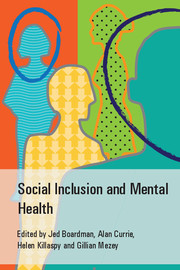Book contents
- Frontmatter
- Contents
- List of contributors
- List of tables, boxes and figures
- Foreword
- Preface
- Acknowledgements
- Scoping Group on Social Inclusion, Royal College of Psychiatrists
- Part 1 What is social exclusion?
- Part 2 Social exclusion: the scope of the problem
- 7 The extent of disadvantage, poverty and social exclusion in the UK
- 8 How are people with mental health problems excluded?
- 9 Social exclusion in specific social groups and individuals with mental health problems
- 10 Social exclusion and people with mental health problems: developing a clearer picture
- 11 Finding acceptance: the experiences of people who use mental health services
- 12 Social inclusion from the carer's perspective
- Part 3 Working towards inclusive psychiatry
- Index
12 - Social inclusion from the carer's perspective
from Part 2 - Social exclusion: the scope of the problem
Published online by Cambridge University Press: 01 January 2018
- Frontmatter
- Contents
- List of contributors
- List of tables, boxes and figures
- Foreword
- Preface
- Acknowledgements
- Scoping Group on Social Inclusion, Royal College of Psychiatrists
- Part 1 What is social exclusion?
- Part 2 Social exclusion: the scope of the problem
- 7 The extent of disadvantage, poverty and social exclusion in the UK
- 8 How are people with mental health problems excluded?
- 9 Social exclusion in specific social groups and individuals with mental health problems
- 10 Social exclusion and people with mental health problems: developing a clearer picture
- 11 Finding acceptance: the experiences of people who use mental health services
- 12 Social inclusion from the carer's perspective
- Part 3 Working towards inclusive psychiatry
- Index
Summary
We are all members of the National Social Inclusion Programme's Reference Group and here we reflect on our experiences of carers or of being a carer for people with severe and enduring mental health problems. David and Rosemary have family members with mental health problems and Rosemary also uses mental health services herself; Michael works as a volunteer with carers and Susan is a carer of her elderly mother; they both also have experience of mental health services. Our experiences are both similar and distinct and reflect the differences between carer and service user viewpoints. For people who act as carers, particularly those who have family members with mental health problems, there is more than one individual who experiences exclusion and the journey of recovery. The four perspectives here reflect this and illustrate the potential tensions that engagement with services and the desire for different outcomes and choices can engender. Admittedly, many of the causes and solutions to exclusion involve political and social changes, but we will be concentrating on how mental health professionals and services can help in facilitating inclusion or how they may hinder the process of recovery.
David: Caring for a spouse
I have been a carer to my spouse who suffers from bipolar disorder for the past 15 years. She has not had an in-patient episode for over 7 years and we both have learnt to manage the condition and our lives. As our situation became more stable and we began to enjoy more of a ‘normal’ life again, I began to realise that our recovery was intimately linked to increasing experiences of social inclusion, and that much of our distress was exacerbated, even caused, by our experience of exclusion. This exclusion was experienced in many ways and for me was a reflection of my personal needs and altered personal relationships, my experiences of employment and financial difficulties, the increasing isolation from people and social contacts, my experience of health services and my need for information on matters about which I was previously ignorant.
- Type
- Chapter
- Information
- Social Inclusion and Mental Health , pp. 259 - 276Publisher: Royal College of PsychiatristsPrint publication year: 2010

